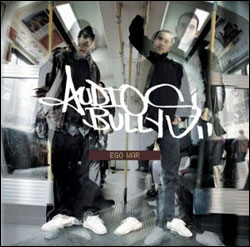AUDIO BULLYS
Ego War
(Astralwerks)
It’d be easy to dismiss the Audio Bullys as an electron-enriched Happy Mondays update for people who actually like music. After all, like Shawn Ryder and company in their day (or was it two?), Simon Franks and Tom Dinsdale lead with their laddishness, keep the tunes simple, and, most importantly, aspire to marry electronic dance music with classic English pop. The difference between the two, as Ego War reveals in no uncertain terms, is that the Bullys actually pull the union off. (That, and they don’t have a tambourine player.) Plus, they manage the feat without trying to bamboozle the masses by falling back on anybody’s clichés and/or resorting to mere bombast, gambits that have served would-be English culture-clash perps like EMF and Jesus Jones (albeit rarely well) ever since PiL first went careering. In fact, Franks and Dinsdale bully so many genres through the Vegematic, and with so much finesse, that the results smell as fresh as a new pair of socks flapping on a clothesline in Ibiza. “Real Life” reads like a hybrid of garage, early Chicago house, and Mark Stewart’s distorted dub paranoia back when he still remembered what being in the Pop Group was like. “We Don’t Care” comes off like Basement Jaxx and John Lydon collaborating on a tribute to the early Who. And while Franks’ lyrics tend to be about as deep as a fishing license, he’s absorbed enough hip-hop to keep them moving along in a lively fashion. ROD SMITH
M. WARD
Transfiguration of Vincent
(Merge)
In some Irish villages, neighbors still feel secure enough to leave their doors unlocked. It’s easy to imagine a troubadour like Portland, Ore.’s Matt (M.) Ward, loaded with bundles of sheet music and Van Morrison melodies, stumbling in to use the bathroom and pausing by the piano on his way out. Ward’s demeanor is as warm and familiar as the photographs staring back from their perch atop the piano, faded by years of sunlight. “Throwback” here is as much a reference to Ward’s glottal delivery as a nod to bygone eras, a Nick Drake-doing-Tom Waits warble emanating from behind whatever instrument happens to be lying around. Ward’s third parchment-wrapped capsule of piano-and-guitar blues, Transfiguration of Vincent laments the loss of friend Vincent O’Brien. Most importantly, it’s a celebration of the elusive gentleman’s life. From the namesake piece, in which Ward offers, “He only sings when he’s sad/And he’s sad all the time so he sings the whole night through,” Transfiguration feels like a wake during last call. “Sad, Sad Song” mixes Kipling-style folklore with a pulsing kick-drum. Throughout, Ward’s own field recordings find crickets competing with regular percussion for time-keeping duties. Only the presence of a keyboard humming in the fray of “Outta My Head” provides some semblance of modernitythat, and a take on David Bowie’s “Let’s Dance” plucked out so discreetly on acoustic guitar that you’d swear it was written by Davey Arthur, not Dame David. KATE SILVER
M. Ward and the Band of 4 play Graceland at 6 p.m. Fri., June 11, with Rilo Kiley, Calvin Johnson, and the Golden Age. $8 adv.
TV ON THE RADIO
Young Liars
(Touch & Go)
If you had a young Peter Gabriel, Brian Eno, Prince, and the members of Pink Floyd circa 1968 over for drinks, this Brooklyn band’s EP would be what you’d play after the peace pipe started to circulate. Heavily textured and atmospheric, Young Liars is half an hour of symphonic pop that, happily, sounds more like a well-timed accident than an actual orchestra. Owing largely to the fact that TVOTR’s keyboardist/sound constructor, David Andrew Sitek, does the bulk of his professional business in the post-everything indie-rock production trade (he’s worked with Liars, Yeah Yeah Yeahs, and Love Life), Young Liars sparkles, hisses, grooves, and gratesseamlessly. “Satellite,” the leadoff track, bumps with a disco fuzz and beats with an after-hours organic amphetamine rush. Two songs later, “Blind” is a seven-minute laid-back piano-lounge space sprawl, while the finale, “Mister Grieves,” is an almost a cappella, South Philly version of the Pixies song. (I wonder why Frank Black never thought of throwing in some barbershop harmonies.) Ribbons of reed instruments are as common as beat-up junkyard loops. Unifying this range of styles and soundssomething has tois the rich, crystalline voice of Tunde Adebimpe. In a manner sure to unhinge the current crop of indie experimenters, Adebimpe actually sings. While music fans fully committed to the angular aesthetic that makes the kids go pogo right now will most assuredly bristle at his luscious croonand cynics might even associate him with ’80s adult- contemporary star SealAdebimpe’s timbre is a gorgeous anchor and a strong, welcome signal on any dial. LAURA CASSIDY




